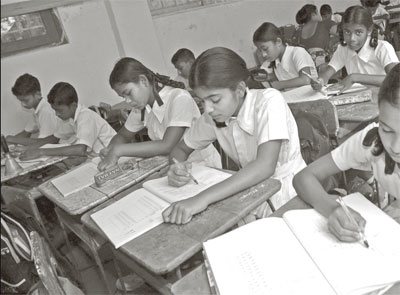Tolerance through education
Address by Monitoring Education
Minister Mohan Lal Grero, titled ‘Promoting moderation, tolerance and
co-existence through education’, National Conference on the Role of
Education in Reconciliation at the Kadirgamar Institute, March 13, 2012
The theme of my speech today is promoting moderation, tolerance and
co-existence through education. I'm afraid my speech is going to be
purely academic. Learning moderation, tolerance and co-existence through
education is probably one of the major issues in education today. The
contemporary world is too often a world of violence that belies the hope
that some people place in human progress. There has always been conflict
throughout history, but new factors are facilitating the risk, in
particular the extraordinary capacity of humanity for self-destruction
that has been created in the course of the 20th century.
Through the media, the general public is becoming an important
observer, even the hostage, of those who create and maintain conflict.
|

Minister Mohan Lal Grero |
Education has up to now not been able to alleviate this poor state of
affairs. But it is possible to device a form of education which might
make it possible to avoid conflicts or resolve them peacefully, by
developing the quality of respect in individuals’ towards people of
different cultures and their spiritual values.
The idea of teaching 'non-violence' in schools is laudable, even if
it is only one means among many for combating the prejudices that lead
to conflict. It is a difficult task since people very naturally tend to
over value their own qualities.
They stand very high in their own estimation and those of their group
as well, and harbour prejudices against others. Furthermore, the general
climate of competition that is at present a characteristic of economic
activity within, and above all, between nations, tends to give priority
to the competitive spirit and individual success. Such competition now
amounts to ruthless economic warfare and to a tension between the rich
and poor, between nations around the world and is exacerbating rivalry.
It is regrettable that education sometimes helps to maintain this
climate. How can we do better?
Different groups
Experiences show that to reduce this risk it is not enough to only
organize contact, as Professor Gunaratna said. Contact is important but
to organize contact and communication between members of different
groups, for example schools shared by several ethnic groups or
religions, is more important. It is the different groups that are in
competition, due to the unequal status in the environment they share.
Therefore, sometimes such contact can on the contrary inflame latent
tensions and degenerate into conflicts.
On the other hand, if contact takes place in an egalitarian context
and there are common objectives and shared purposes, prejudices and
latent hostilities can dwindle and give way to more relaxed cooperation
and even friendships sometimes. It would seem therefore that education
must take two complimentary paths.
On one level the gradual discovery of others and on another, the
experience of shared purposes throughout life which seems to be a very
prudent way of avoiding latent conflicts.
The task of education is to teach at once and the same time, the
diversity of the human race and create an awareness of similarities
between us and the interdependence of all human beings.
From early childhood, schools must therefore take every opportunity
to teach these things. Some subjects are particularly suited for this
task. If one is to understand the other, one must first know one's self
to give children and young people an accurate view of the world.
Education, be it in school, in the family or community must first
help them to understand who they are. Only then would they be able to
genuinely put themselves into other people's shoes and understand their
reactions.
|

Education, key to future success |
Cultural activities
Developing such empathy in schools bears fruit in terms of social
behaviour throughout life. For example, by teaching young people to
adopt the point of view of other ethnic or religious groups, the lack of
understanding that leads to hatred and violence among adults can be
avoided.
The teaching of the history of religions and customs can thus serve
as a useful benchmark for future behaviour. Finally, the actual form of
teaching must not run counter to the acknowledgement of others. Teachers
whose dogmatic approach stifles pupils' curiosity or critical thinking
spirit, instead of inculcating those qualities in them, can do more harm
than good.
If teachers forget that they are role models, their attitude may
forever weaken their pupils' ability to be receptive to others and face
the inevitable tension between people, groups and nations.
Encountering others through dialogue and debate is one of the tools
needed in the current education system. When people work together on
rewarding projects which take them out of their usual routines, as very
correctly mentioned by Prof. Rohan Gunaratna, differences and conflicts
between individuals tend to fade to the background and sometimes may
even disappear. People derive a new identity from such projects, so that
it is possible to go beyond individuality and highlight what people have
in common rather than the differences between them.
Humanitarian work
In many cases tension between social classes and nationalities have,
in the end, been transformed to unity because of the common effort
involved, for example in sports. Similarly, where work is concerned many
ventures would never have been successfully completed if conflicts
commonly found in hierarchical organizations are transcended by a shared
purpose.
Formal education must therefore provide enough time and opportunity
in its programme to introduce the young from childhood to co-operate
through participation in sports or in cultural activities and also
participation in social activities such as neighbourhood innovation,
helping the underprivileged, humanitarian work, inter-generational
assistance, etc.
Other educational organizations and statutory bodies must take over
where schools leave off.
In addition, in everyday school life the involvement of teachers and
pupils in joint undertakings could provide initiation to a way of
resolving conflicts and a benchmark for teachings to be referred in the
future, while at the same time enhancing mutual respect and long lasting
harmony. |



